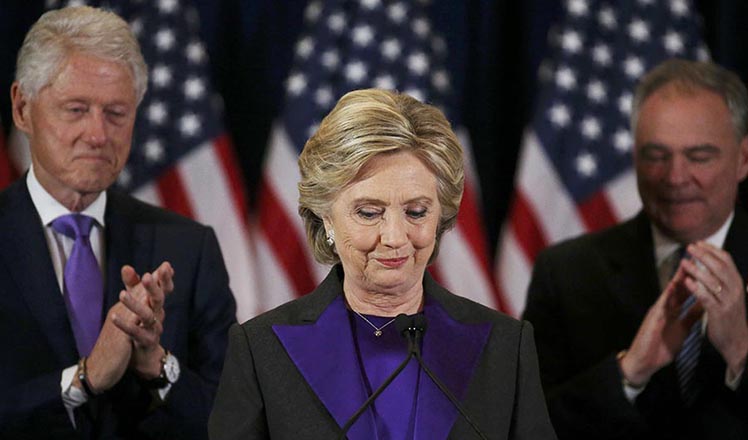Yuan slumps to six-year low against greenback
Updated: 2016-11-11 17:33
(Xinhua)
|
||||||||
BEIJING - The Chinese currency weakened against the US dollar Friday to a six-year low, with the dollar riding a Donald Trump rally alongside upbeat economic data, while experts believe there is no basis for persistent depreciation of the yuan.
The central parity rate of the renminbi lost 230 basis points, falling to 6.8115 against the dollar Friday, breaking the psychologically-important threshold of 6.80 for the first time since Sept 2, 2010, according to data from the China Foreign Exchange Trade System.
In China's spot foreign exchange market, the yuan is allowed to rise or fall by 2 percent from the central parity rate each trading day. The central parity rate of the yuan against the dollar is based on a weighted average of prices offered by market makers before the opening of the interbank market each business day.
Trump defeated Democratic candidate Hillary Clinton in US presidential election Tuesday, and the dollar has rallied against several major currencies since Wednesday on the back of a string of positive economic data and the expectation of a looming US interest rate hike.
The predictions of an interest rate increase by the US Federal Reserve in December did not change after the presidential election, which led to a stronger dollar and weaker non-dollar currencies, said Liu Yangyi, an analyst with the Bank of China.
The number of Americans applying for unemployment aid fell more than market expectations last week as the job market kept improving, according to latest data, which strengthened the rationale for a US interest rate increase.
US equities are reaching new highs as some investors believe that Trump is likely to cut taxes, which they believe will provide stability to the market and bolster economic growth.
However, experts caution that the day-to-day foreign exchange market can be volatile, and there is no basis for persistent yuan depreciation as China continues to witness steady economic growth, progress in economic restructuring and a stable financial market.
The recent depreciation of major currencies against the dollar was a more passive market response to US interest rate hike expectations, and does not point to weaknesses in China's economic fundamentals, said Chen Ying, a senior analyst at CITIC Securities.
The dollar index, which measures the dollar against six major currencies, including the euro and sterling, advanced by about 3 percent last month to 98.35 on October 31.
As global markets digested the implications of Trump's unexpected victory over market-favourite Hillary Clinton, the index slumped to an intra-day low of 95.8875 Wednesday, but strengthened sharply to close at 98.7836 Thursday with market jitters easing.
Some analysts, including Chen, believe that the room for the dollar index to climb further this year is limited.
If the dollar index cannot surpass 100 in the short term, then its room for further increases will be very small, predicted Wan Zhao, a senior analyst with China Merchants Bank.
"It is quite likely that the value of the dollar will oscillate within a band, which will reduce the possibility of sharp depreciation of the yuan and ease pressure of capital outflows," Wan said.
China has the world's largest currency hoard, though it fell to $3.12 trillion at the end of October, down $45.7 billion on a month earlier, marking the lowest level since March 2011, but a stronger dollar accounts for much of that change.
- Online shopping frenzy sparks trash concern
- Is it a thing? 10 odd jobs where you can make good money
- Message on a bottle: Mineral water company launches drive to find missing children
- Snow leopards caught on camera
- A foreigner's guide to Singles Day shopping spree
- China jails 49 for catastrophic Tianjin warehouse blasts
- Americans want to change presidential election system
- UK business calls for exclusive visa system for post-Brexit London
- Australia poised to sign refugee deal with United States: media
- Philippines' Duterte says he is against 2014 defense pact with US
- S.Africa wants to work with US in promoting peace: Zuma
- Trump's victory on global pages

 Alibaba breaks sales record on Singles Day
Alibaba breaks sales record on Singles Day
 Ten photos from around China: Nov 4-10
Ten photos from around China: Nov 4-10
 Snow storm hits Xinjiang
Snow storm hits Xinjiang
 Clinton concedes election, urges open mind on Trump
Clinton concedes election, urges open mind on Trump
 Places to enjoy golden gingko tree leaves
Places to enjoy golden gingko tree leaves
 Taobao village gets ready for shopping spree on 11/11
Taobao village gets ready for shopping spree on 11/11
 Overhead bridge rotated in East China's Shandong
Overhead bridge rotated in East China's Shandong
 The 75th anniversary of Red Square parade celebrated
The 75th anniversary of Red Square parade celebrated
Most Viewed
Editor's Picks

|

|

|

|

|

|
Today's Top News
No environmental shortcuts
US election rhetoric unlikely to foreshadow future US-China relations
'Zero Hunger Run' held in Rome
Trump outlines anti-terror plan, proposing extreme vetting for immigrants
Phelps puts spotlight on cupping
US launches airstrikes against IS targets in Libya's Sirte
Ministry slams US-Korean THAAD deployment
Two police officers shot at protest in Dallas
US Weekly

|

|








